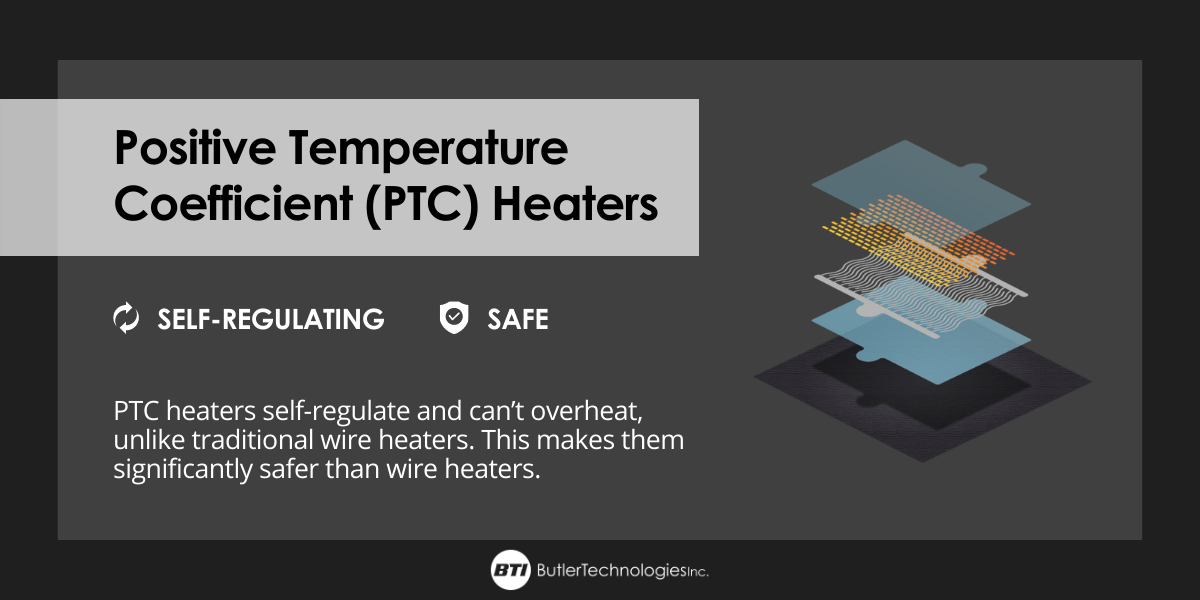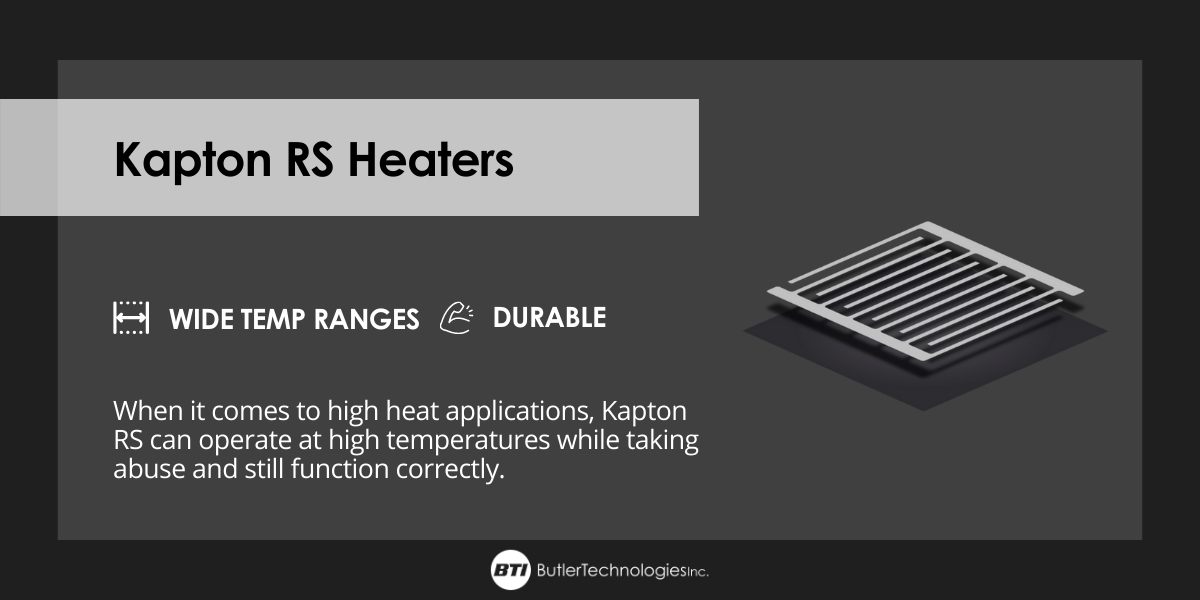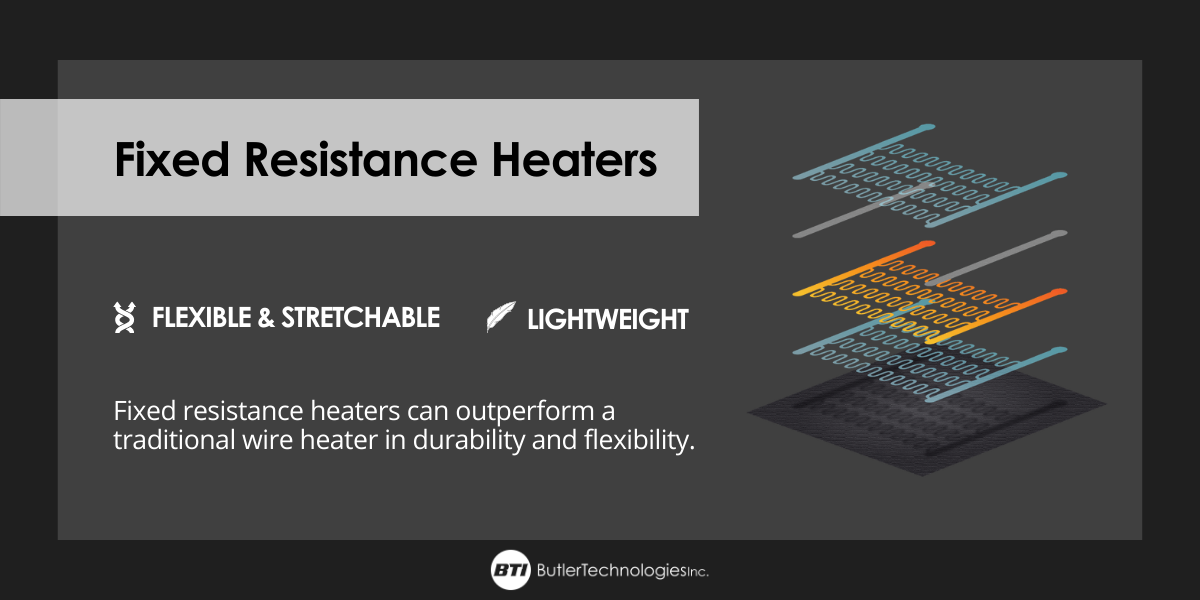What Are Flexible Heaters
Put in plain and simple words, flexible printed heaters are warming elements. They are manufactured to add heat to products, clothing, etc.; Precision screen printing is used to print conductive or resistive inks on flexible materials. The inks are typically comprised of both resistive and conductive materials, including functional carbon or silver. This makes it possible to create different solutions to cater to unique needs and specific requirements. Common print substrates are polyester, polycarbonate, or polyimide – Kapton RS conductive films. They can also be printed on thermoplastic polyurethanes known as TPU. TPU heaters are typical for the garment industry because of the flexibility and elasticity of the material.
Flexible Printed Heater technology is becoming extremely common today and is finding use in various industries and applications. They are commonly used in automotive seat warming, sports apparel, and retail clothing industries. They are also found in food service, aerospace, consumer products, medical and healthcare applications. The technology is also used in electronic and electrical industries.
While traditional wired heaters are heavy, restrictive, and require an outlet, printed heaters are lightweight, thin, and conformable. Printed heaters can produce better results without limiting movement or comfort, and providing solutions for applications not possible with wired heaters.
Multiple Uses for Printed Heaters
Printed heating devices have a range of uses and applications. They are commonly used in the retail clothing industry and sports garments. With the specialty inks and substrates that are now available, customers can be sure that the circuits will perform well for their application. The flexible construction due to the materials available today conforms to the curves and build of the human body, allowing the user to move freely and not restrict activity or mobility. The printing is applied to very thin films and will not add any significant weight to the products it is applied to. In the case of apparel and wearables, the printing work is done on thin TPU substrates and then they are transferred to textiles using heat transfer. This allows the TPU to be secured to different garments from Athletic Gear, to Medical Bandages, to industrial equipment.
The 3 Types of Printed Heaters
Both Kapton RS and PTC continue to be widely accepted because of their flexibility in heating systems. However, while Kapton heaters are thin and flexible, PTC heaters are thin, flexible, and stretchable. Both offer extremely lightweight heating solutions.
Positive Temperature Coefficient (PTC) Heater
PTC or Positive Temperature Coefficient heaters are well known for their safety, elasticity, flexibility, and ease of use, and are common in garments and wearables. PTC heaters work wonderfully by producing safe and comfortable low heat. PTC carbons work by acting as electrical resistance and heat up when current is applied.
PTC flexible printed heaters are ideal for certain clothing applications. The PTC Heaters can be printed on flexible material such as DuPont Intexar TPU.
PTC heaters use carbon ink. This carbon ink has resistive properties that change with temperature — when current flows through the heater, the resistivity increases. As the heater reaches an equilibrium, the resistive elements stabilize and the flow of the current through the heater is decreased. This process repeats again and again, with small fluctuations not noticeable by the wearer.Benefits of Positive Temperature Coefficient (PTC) Heaters:
- “Self-limiting” temperature control: Heaters that are PTC carbon-based are self-limiting and do not require a controller. The heater is designed to “shut-off” at a pre-determined temperature. This is considered a “self-limiting” heater and without the need for external diagnostics or controls.
- Provide uniform heat with no hot spots
- Require less power to operate
- More reliable in extreme temperature fluctuations to their cold-state failure mode

Kapton® RS
Kapton RS is a high quality electrically conductive polyamide film. Kapton is thin and lightweight. Kapton only requires the need to print conductive silver bus bars to create heating zones, as the film itself — an electrically conductive polyimide film — is resistive much like the carbon ink used in PTC heaters.
Kapton heaters are used in situations where the heating requirements are higher, and can reach temperatures of up to 240° C. This makes them ideal for industrial applications where elevated temperatures are a must.
DuPont’s Kapton RS heaters have a wider acceptance and application use. The one downside to Kapton RS heaters is that they need to be regulated to maintain a constant temperature. The more power you supply the hotter it gets.Benefits of Kapton RS heaters:
- Operational and Product Stability: Stable resistivity over wide temperature range and duration, reducing design uncertainty
- Wide Operating Temperature Range and design Flexibility: Heating element temperatures adjustable by zones within the same heating element
- Efficient Area heating: conductive filler evenly dispersed throughout surface allows for effective use of entire area of film for heating
- Safe and Durable: damage to film (holes or tears) will not cause shorts as with wire-based or filament-based heaters. This can improve the overall safety of the application.

Fixed Resistance Heaters
Fixed resistance heaters are the most similar to traditional wired heaters you’ve likely interacted with before. Instead of wiring, fixed resistance heaters have lines, or traces, of a resistive ink printed onto a substrate material such as PET or TPU. These printed silver or carbon ink coils produce heat themselves and can be regulated via an external controller or battery pack.
Fixed resistance heaters are ideal for high-stretch applications such as in performance athletics or healthcare, as they can conform tightly around the body when used in compression clothing, joint braces, and more.
Benefits of Fixed Resistance Heaters:
- More time- and cost-effective as they require less ink and print steps
- Stretch with the user
- Flexible and light-weight for seamless integration into garments and other consumer-friendly applications

Applications for Flexible Printed Heaters
Flexible printed heaters can be incorporated into a vast array of applications, ranging from wearable smart clothing to industrial machinery. Any application currently using a wired heater can be adjusted to rely on a wireless, battery-operated, and portable heater instead — yet, these heaters are also being incorporated into new and exciting applications every day.
Here are just a few of the use cases we’ve seen across multiple industries.
Flexible Printed Heaters in the Medical Industry
- Heated wraps and braces
- Heated hospital beds
- Heated blankets
- Heated physical therapy equipment
Flexible Printed Heaters in Industrial Controls
- Floor heating
- Lab heaters
- Heaters for manufacturing and industrial machinery
Flexible Printed Heaters in Safety
- Heated gloves for outdoor maintenance workers
- Heated heavy equipment seats
- Heated knee or back braces for workers who are on their feet
Flexible Printed Heaters in the Transportation & Automotive Industries
- Interior heating
- Seat heating
- Battery warming
- Spacecraft temperature regulation
- Temperature sensing
- Plane heating
- Airplane Wing de-icing
Flexible Printed Heaters for Performance Sportswear & Outdoor Enthusiasts
- Heated sleeping bags
- Heated tent bases
- Heated boots, socks, gloves, hats, or jackets
Flexible Printed Heaters for Military & Defense
- Heated compression clothing
- Heated gloves, socks, or caps
- Heated equipment grips
How to Choose Which Type of Printed Heater You Need
Each type of printed heater has its benefits. To determine which type you should choose, you should consider the end use of your product, as well as your priorities for this project.
Kapton RS heaters are commonly used in industrial applications where the required temperature is much higher, and flexibility isn’t paramount. They’re often used in aerospace applications and automotive interior heating, as well as wind turbine deicing.
When you compare Kapton RS with PTC heaters you will find a difference in their resistive properties. Kapton RS inherently offers uniform resistance, which ensures constant surface temperatures. Hence, if you are looking for selective applications where uniform heating is needed Kapton RS would be the best choice. However, when it comes to recurring cost of usage, PTC heaters perhaps are better.
If recurring cost of usage is of greater concern, PTC or Fixed Resistance Heaters may work better.
Learn more about how to choose the right printed heater for your next product.
The Final Word
At the end of the day, there is no doubt that each type of flexible printed heater has its own pros and cons. Butler Technologies Inc. has expertise in both technologies and can assist in making you comfortable with the application that suits your needs.
There is no doubt the world of flexible printed heating systems is evolving rapidly. If you have an application for a flexible printed heater, get in touch with us. We would be happy to talk with you to help you choose the technology that will meet your specific needs and requirements.
Contact us today for more information.
Meet the Author
 Madelyn is an integrated marketing specialist at Butler Technologies and has a passion for problem-solving, project management, and storytelling. She loves marketing in the B2B technology space and has a degree in English specializing in editing, writing and media from Florida State University.
Madelyn is an integrated marketing specialist at Butler Technologies and has a passion for problem-solving, project management, and storytelling. She loves marketing in the B2B technology space and has a degree in English specializing in editing, writing and media from Florida State University.
